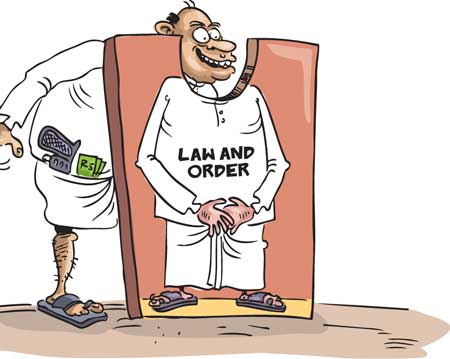Reply To:
Name - Reply Comment
When the LTTE was militarily defeated certain sections called for an immediate withdrawal of the security forces from the former conflict zone. That was laughable if not preposterous. The end of the armed conflict does not necessarily mean the absolute elimination of threat nor the resolution of grievances, perceived or real, that are said to have spawned conflict in the first place. A nation that has struggled to overcome terrorism is well advised not to drop vigilance levels. Indeed, subsequent developments have proven the error of such advice. Even as demilitarization happens, military intelligence should not be weakened. Certain things take time.

The same principle can be applied to the issue of law and order. The defeat of a regime accused of gross neglect and indeed the subversion of the Rule of Law does not result in the immediate decline in crime and a corresponding rise in the performance of law enforcement authorities. It takes time. It takes time because systems and cultures are robust and therefore resilient to transformation. The problem, to put it crudely, is bigger than the Rajapaksas. One recalls that there was crime and a breakdown of law enforcement before 2005 with some situations being far worse than what was seen during the previous regime. That should demonstrate the strength of structures that make for breach and for sustaining such breaches as there may be.
This is why it is unfair to point fingers at this Government on account of a manifest struggle to re-establish the Rule of Law. Some important changes have been made, for example the re-institution of the Police Commission. However, it takes time for the results of such moves to show. It requires robust application of the established procedures and more importantly the relentless rehearsal of such mechanism by both the public and the law enforcement authorities.
Therefore questions such as ‘So is everything alright now?’ or ‘Is there law and order now?’ are unfair. There was a perceptible rise in crime in Sri Lanka after May 2009. The key word here is ‘perception’. The truth is that war affected a diminishing or rather a discoloration of other issues, including crime. The end of the war helped bring to the public eye all the things that were ‘backgrounded’ by the horrors and anxieties of war.
Perhaps the same thing happened immediately after the defeat of President Mahinda Rajapaksa in January 8, 2015. It was not that the crime rate went down immediately. The ‘change’ was news and remained newsworthy for several months. Its shelf life was extended by a General Election just six months later. Off the limelight, criminals and criminality thrived. Today, things are different.
What is disturbing, however, is not crime regaining its ‘rightful’ worth for the purposes of media houses. What worries is the fact that there have been several incidents of arrests that violate the principle of ‘due process’. True, we are not seeing ‘white-vanning’ of horrifying proportions, although ‘horror’ too can be exaggerated as per the political purposes of the ‘horrified’. Yesterday a group calling itself ‘Families of the Disappeared’ staged a demonstration near Thunmulla Junction, i.e. near the UN compound. It is clear whose ears the protesters were seeking. While we can debate about the true purposes of such protests, they did make a valid point.
They also conceded that they did not object to the Police arresting any person suspected of links with the LTTE or drug trafficking. The objection is to the method of arrest. No one should be abducted in any inappropriate manner, they stressed, referring to several such cases reported from Kilinochchi, Ampara and Negombo. ‘In wars, the laws are silent,’ J.R. Jayewardene reminded people in justifying the excesses during his tenure, never mind the fact that some of these excesses were exercised against those who were clearly not at war and were certainly not armed. What’s relevant here is that we are not in the middle of a war. Thus, while there is always a threat of terrorism, we are not facing armed insurrection. As such the regular laws of the country must apply to the exclusion of all else.
What is alarming is that less than a year and a half after coming to power pledging ‘change’ and in particular waxing eloquent about law and order, there are signs of a return to the ‘convenience’ of operating outside the ambit of the law, whatever the objective may be. The protesters were right. Abduction is out of order and worse reason for alarm. White-vanning is not the way to go, if you want to progress. It’s a step backwards and towards an abyss no one wants to go near.